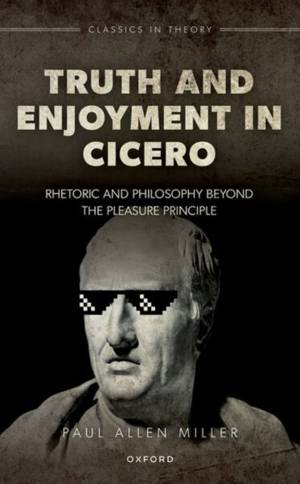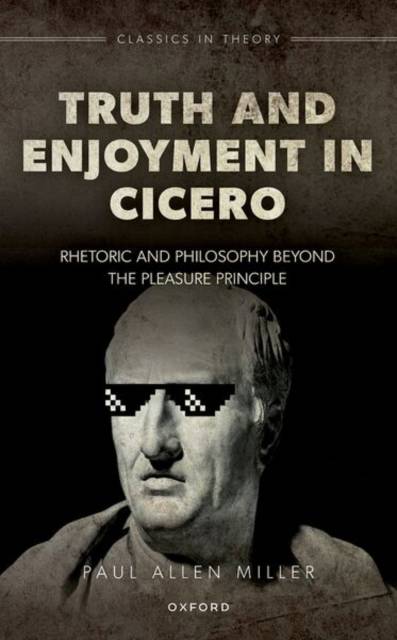
- Retrait en 2 heures
- Assortiment impressionnant
- Paiement sécurisé
- Toujours un magasin près de chez vous
- Retrait gratuit dans votre magasin Club
- 7.000.0000 titres dans notre catalogue
- Payer en toute sécurité
- Toujours un magasin près de chez vous
Truth and Enjoyment in Cicero
Rhetoric and Philosophy Beyond the Pleasure Principle
Paul Allen Miller
158,95 €
+ 317 points
Description
Truth and Enjoyment in Cicero offers a fundamental re-examination of the relation between truth and enjoyment as understood in the traditional confrontation between rhetoric and philosophy in Cicero. His simultaneous advocacy of classical rationality and continued emphasis on the importance of performativity and enjoyment in language-on ratio as a desire (cupiditas) and force (vis) in the real-situates him at the crossroads of reason and the unconscious. Where the modern concept of truth abstracts truth from the subjective experience of speaker and hearer, for Cicero truth is inseparable from our experience of it, and it is precisely the possibility of their separation that he criticizes in works like De Oratore and De Re Publica where he seeks an ideal reconciliation between rhetoric and philosophy, truth and enjoyment. This book looks at the problem of enjoyment (jouissance) as central to understanding the differend between rhetoric and philosophy. Paul Allen Miller distinguishes "pleasure" from "enjoyment," with pleasure always being balanced by the constraints of the reality principle and hence always open to substitution and deferral. Jouissance, however, is a drive that leads beyond any utilitarian calculus, seeking a form of radical experience that can be both sublime and destructive. There has never been a psychoanalytic treatment of Cicero's philosophical works, and while we must beware of crude attempts to psychoanalyze a long-dead author, Freud's hermeneutic model can provide new insights into Cicero's investment in concepts of desire, the sublime, and the abject, as well as how these concepts undergird his understanding of rational appeals to his audience. The conflict between rhetoric and philosophy dates to at least the fifth century. It has often understood itself as a conflict between a discourse that speaks to desire and one that speaks to truth. In the Gorgias, the rhetor is compared to the pastry chef, while the philosopher is the doctor whose bitter gall leads to health. Cicero is situated at this nexus between these figures, and, as he has Crassus argue in De Oratore Book 3, we live a more destitute and impoverished existence since these functions of discourse, truth and desire, have been split apart. Miller offers the first psychoanalytic account of Cicero as a philosopher and rhetorician, bringing a fresh reading of five Cicero's major works during a crucial period of the Roman republic.
Spécifications
Parties prenantes
- Auteur(s) :
- Editeur:
Contenu
- Nombre de pages :
- 320
- Langue:
- Anglais
- Collection :
Caractéristiques
- EAN:
- 9780198931324
- Date de parution :
- 16-07-26
- Format:
- Livre relié
- Format numérique:
- Genaaid
- Dimensions :
- 138 mm x 216 mm

Seulement chez Librairie Club
+ 317 points sur votre carte client de Librairie Club
Les avis
Nous publions uniquement les avis qui respectent les conditions requises. Consultez nos conditions pour les avis.





